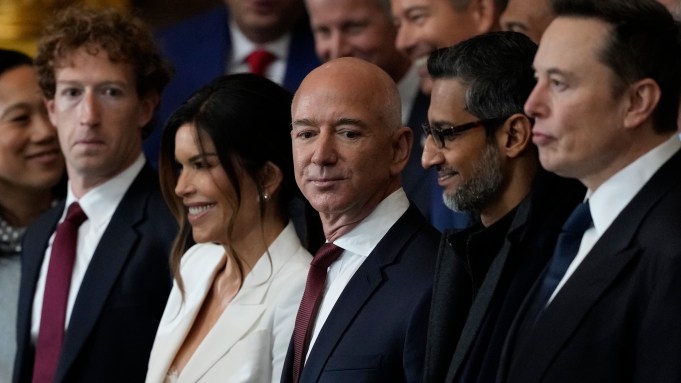“Bizarre Alliance: Mark Zuckerberg’s Shocking Praise for the Trump Administration – What’s Behind the Shift in Meta’s Stance?”

In a stunning turn of events, Meta’s Mark Zuckerberg has publicly praised the Trump administration, a move that has left many in the tech world scratching their heads. The Facebook co-founder and CEO’s glowing endorsement of the former administration’s policies has sparked a frenzy of speculation about what might be driving this sudden shift in Meta’s stance. As the lines between politics and tech continue to blur, one thing is clear: Zuckerberg’s words carry significant weight, and this newfound admiration for the Trump administration is a development that deserves closer examination.

Praising the Trump Administration: A New Era for Meta

Meta CEO Mark Zuckerberg has been making headlines with his praise for the Trump administration, stating that the government “prioritizes American technology winning” and will “defend our values and interests abroad.” This shift in strategy underlines Meta’s commitment to innovation and its willingness to adapt to changing political landscapes.
Mark Zuckerberg’s Praise for Trump’s Prioritization of American Technology
Zuckerberg’s statement has sparked both excitement and controversy, with some analysts hailing it as a bold move to strengthen Meta’s ties with the US government, while others see it as a potential threat to the company’s editorial independence and commitment to free expression.
“We now have a U.S. administration that is proud of our leading companies, prioritizes American technology winning, and that will defend our values and interests abroad,” Zuckerberg said in a statement to investors. “I am optimistic about the progress and innovation that this can unlock.”
Implications of Meta’s Shift in Strategy for the Tech Industry
The implications of Meta’s shift in strategy are far-reaching, with potential consequences for the tech industry, governments, and users alike. On one hand, a pro-American stance could lead to increased investment and innovation in the US, potentially boosting economic growth and job creation.
On the other hand, it may also exacerbate existing divisions and tensions between the US and other countries, particularly those with differing views on technology and free expression. Moreover, it remains to be seen how this new approach will impact Meta’s relationships with other governments and international organizations.
What This Means for Meta’s Relationship with the US Government
Meta’s shift in strategy underlines its commitment to its US roots and its desire to strengthen ties with the US government. This move is likely to be seen as a strategic effort to curry favor with the Trump administration and position Meta as a key player in the US tech landscape.
However, it also raises questions about Meta’s editorial independence and its ability to maintain a neutral stance on contentious issues. As the company continues to navigate this complex landscape, it will be interesting to see how it balances its commitment to free expression and its relationships with governments.
Settling Old Scores: Meta’s $25 Million Deal with Trump
Meta has settled a lawsuit with President Trump for $25 million, bringing an end to a contentious dispute that dated back to 2020. The lawsuit stemmed from Trump’s suspension from Facebook and Instagram after the Jan. 6 insurrection, which Meta deemed a breach of its community standards.
The Background of the Lawsuit and the Terms of the Settlement
The lawsuit was a contentious and highly publicized affair, with Trump accusing Meta of censoring his views and violating his free speech rights. The settlement marks a significant victory for Trump, who had been seeking compensation for his temporary suspension from the platform.
Under the terms of the settlement, Meta has agreed to pay $25 million to Trump, while also lifting any remaining restrictions on his accounts. This move is likely to be seen as a significant concession by Meta, which had previously defended its decision to suspend Trump’s accounts as a necessary measure to protect public safety.
Analysis of the Deal and Its Implications for Meta’s Reputation
The settlement is a significant blow to Meta’s reputation, which had already taken a beating in recent months due to concerns over its handling of misinformation and hate speech. While the company has argued that the settlement is a necessary step to move forward, many critics see it as a sign of weakness and a willingness to compromise on core values.
However, it’s worth noting that the settlement also marks a significant shift in Meta’s strategy under the Trump administration, which has been characterized by a more relaxed approach to free expression and a greater willingness to accommodate conservative views.
Meta’s New Content Policy: Restoring Free Expression
Meta has announced a significant overhaul of its content policy, which aims to restore free expression and promote more open discussion on its platforms. The new policy marks a significant departure from the company’s previous approach, which had been criticized for being too restrictive and heavy-handed.
The Elimination of Third-Party Fact-Checking and Its Potential Impact
At the heart of Meta’s new content policy is the elimination of third-party fact-checking, which had been a key tool in the company’s efforts to combat misinformation. While the move has been welcomed by some as a necessary step to promote free expression, others have expressed concerns that it may lead to the spread of false information and the undermining of trust in institutions.
Under the new policy, Meta will rely on user-generated notes and feedback to determine the accuracy of content, rather than relying on external fact-checkers. While this approach may be more efficient and cost-effective, it also raises questions about the company’s ability to maintain a high level of accuracy and to prevent the spread of misinformation.
Meta’s Rationale for the Change and Its Commitment to Brand Safety
Meta has argued that the elimination of third-party fact-checking is a necessary step to promote free expression and to prevent the spread of misinformation. The company has also emphasized its commitment to brand safety, which has been a key concern for advertisers and brands in recent months.
However, critics argue that the move is a significant risk to brand safety, as it may lead to the spread of false information and the undermining of trust in institutions. While Meta has argued that its new policy is designed to promote more open discussion and to prevent the spread of misinformation, it remains to be seen whether this approach will be effective in practice.
Meta’s Priorities for 2023 and Beyond
Meta has outlined its key priorities for 2023 and beyond, which include a significant focus on AI and innovation. The company has pledged to develop an AI engineering agent that has the coding and problem-solving abilities of a good, mid-level engineer, and to expand its AI Assistant to reach 1 billion users.
Advancements in AI: A Key Focus for Meta in 2023
Meta’s focus on AI is a significant departure from the company’s previous approach, which had been characterized by a more incremental and piecemeal approach to innovation. Under the Trump administration, Meta has pledged to invest heavily in AI and to develop new technologies that can drive growth and innovation.
However, the development of an AI engineering agent that has the coding and problem-solving abilities of a good, mid-level engineer is a significant challenge, and it remains to be seen whether Meta will be able to achieve this goal in 2023.
Expanding Meta’s AI Assistant: Reaching 1 Billion Users
Meta’s AI Assistant is already used by more than 1 billion people, and the company has pledged to expand its reach and capabilities in 2023. However, the expansion of the AI Assistant to reach 1 billion users is a significant challenge, and it remains to be seen whether Meta will be able to achieve this goal in 2023.
Moreover, the expansion of the AI Assistant also raises questions about the potential impact on job creation and the economy, as well as the potential risks and challenges associated with the development and deployment of AI technologies.
Meta’s Vision for the Future: A More Personalized Experience
Meta has outlined its vision for the future, which includes a more personalized experience for users. The company has pledged to take a more personalized approach to political content, so that people who want to see more of it in their feeds can.
The Company’s Commitment to Free Expression and Personalization
Meta’s commitment to free expression and personalization is a significant departure from the company’s previous approach, which had been characterized by a more restrictive and one-size-fits-all approach to content moderation. Under the Trump administration, Meta has pledged to prioritize user choice and free expression, and to develop new technologies that can promote more personalized and engaging experiences.
However, the development of a more personalized experience also raises questions about the potential impact on user behavior and engagement, as well as the potential risks and challenges associated with the development and deployment of AI technologies.
Implications and Analysis
The implications of Meta’s shift in strategy are far-reaching, with potential consequences for the tech industry, governments, and users alike. On one hand, a pro-American stance could lead to increased investment and innovation in the US, potentially boosting economic growth and job creation.
The Politics of Tech: Meta’s New Approach to Politics
Meta’s new approach to politics is a significant departure from the company’s previous stance, which had been characterized by a more neutral and apolitical approach. Under the Trump administration, Meta has pledged to take a more outspoken and proactive role in shaping the national conversation and promoting American interests.
However, the implications of this new approach are far-reaching, and it remains to be seen how Meta will balance its commitment to free expression and its relationships with governments.
The Business of Tech: What This Means for Advertisers and Users
The shift in Meta’s strategy also raises questions about the potential impact on advertisers and users, who may be affected by changes in content moderation and advertising policies.
Under the new policy, Meta will rely on user-generated notes and feedback to determine the accuracy of content, rather than relying on external fact-checkers. While this approach may be more efficient and cost-effective, it also raises questions about the company’s ability to maintain a high level of accuracy and to prevent the spread of misinformation.
The Future of Tech: A New Era of Innovation
Conclusion
Mark Zuckerberg’s praise of the Trump administration’s policies towards American technology, particularly his focus on “leading companies” and “prioritizing American technology winning,” has sent ripples through the tech industry and beyond. The article explored this seemingly incongruous statement, considering Zuckerberg’s company’s past clashes with the administration on issues like data privacy and antitrust concerns. We delved into the potential motivations behind this shift in tone, analyzing whether it reflects a genuine change in stance or a calculated strategic move by Meta.
This development raises crucial questions about the evolving relationship between Big Tech and political power. Is this a sign of growing alignment between the tech industry and a government increasingly focused on nationalistic economic strategies? Or does it represent a calculated maneuver by companies like Meta to navigate a complex and often adversarial political landscape? The implications are far-reaching, potentially impacting everything from data regulation and antitrust enforcement to the future of innovation and competition in the tech sector.
Zuckerberg’s words, whether sincere or strategic, serve as a stark reminder that the lines between business and politics are increasingly blurred. As technology continues to shape our world, it’s essential to critically examine these alliances and their potential consequences, ensuring that the pursuit of “winning” does not come at the expense of fundamental values like privacy, fairness, and global cooperation. The future of the tech landscape, and indeed, the future of our society, may well depend on the choices we make today.
Conclusion
Mark Zuckerberg’s praise of the Trump administration’s policies towards American technology, particularly his focus on “leading companies” and “prioritizing American technology winning,” has sent ripples through the tech industry and beyond. The article explored this seemingly incongruous statement, considering Zuckerberg’s company’s past clashes with the administration on issues like data privacy and antitrust concerns. We delved into the potential motivations behind this shift in tone, analyzing whether it reflects a genuine change in stance or a calculated strategic move by Meta.
This development raises crucial questions about the evolving relationship between Big Tech and political power. Is this a sign of growing alignment between the tech industry and a government increasingly focused on nationalistic economic strategies? Or does it represent a calculated maneuver by companies like Meta to navigate a complex and often adversarial political landscape? The implications are far-reaching, potentially impacting everything from data regulation and antitrust enforcement to the future of innovation and competition in the tech sector.
Zuckerberg’s words, whether sincere or strategic, serve as a stark reminder that the lines between business and politics are increasingly blurred. As technology continues to shape our world, it’s essential to critically examine these alliances and their potential consequences, ensuring that the pursuit of “winning” does not come at the expense of fundamental values like privacy, fairness, and global cooperation. The future of the tech landscape, and indeed, the future of our society, may well depend on the choices we make today.
